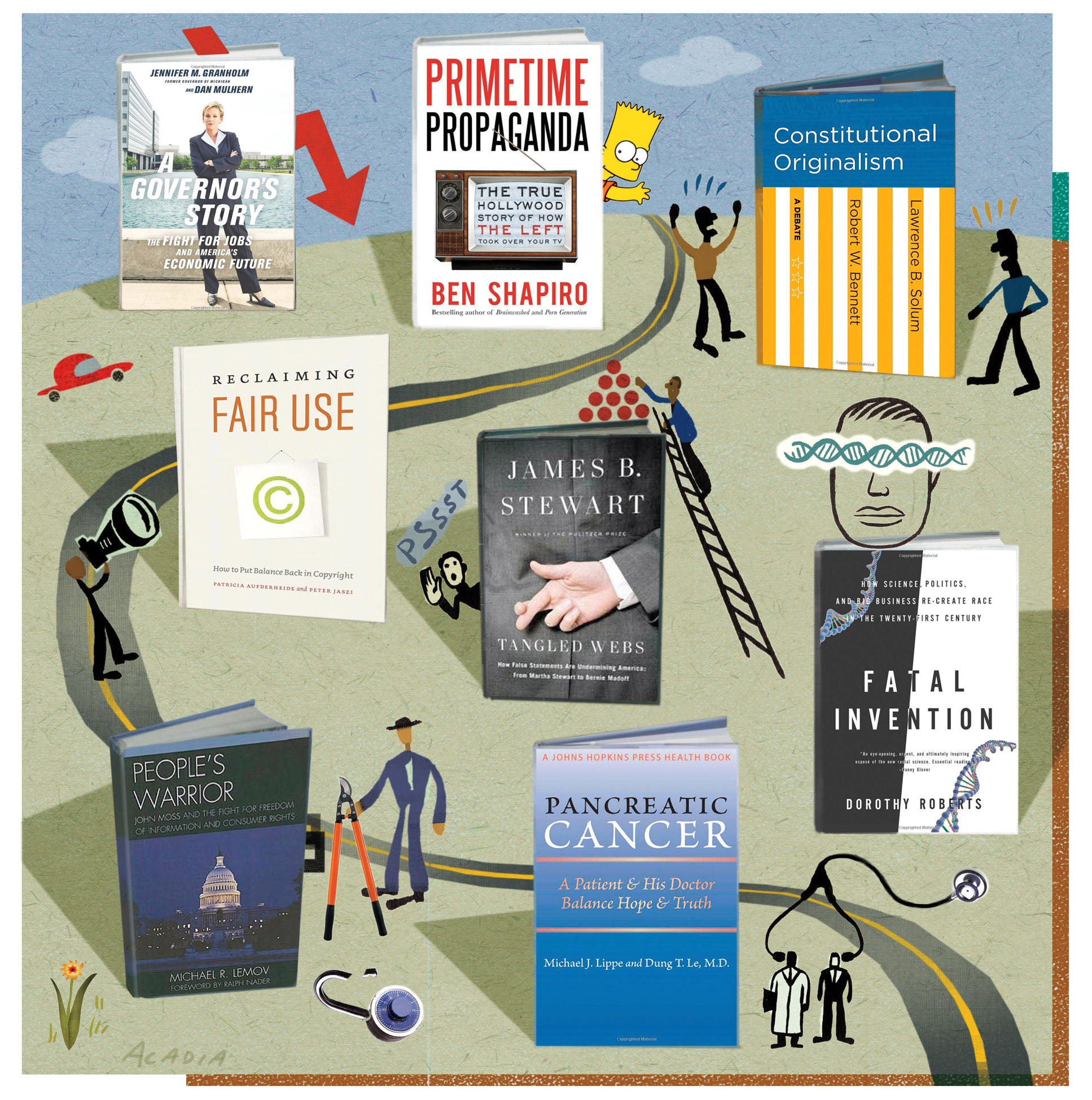“Constitutional Originalism: A Debate” by Robert W. Bennett ’65 and Lawrence B. Solum ’84 (Cornell). In a series of “dueling essays,” Solum advocates for constitutional originalism, while Bennett promotes living constitutionalism and judicial activism. The book challenges both sides of the debate while acknowledging where the two viewpoints find common ground.
“A Governor’s Story: The Fight for Jobs and America’s Economic Future” by Jennifer Granholm ’87 and Dan Mulhern ’86 (PublicAffairs). The former governor of Michigan, Granholm (in collaboration with her husband, Mulhern) reflects on her stewardship of a state hit particularly hard by the economic downturn and on her attempts to revitalize its sagging manufacturing industry through public-private partnerships and clean-energy businesses. The experience in Michigan offers the country lessons about new economic realities and how rigid political ideology can impede progress, they write.
“Reclaiming Fair Use: How to Put Balance Back in Copyright” by Peter Jaszi ’71 and Patricia Aufderheide (Chicago). The book challenges the assumption that copyright law has become unworkable in the digital age. Introducing the experience of documentary filmmakers and other content creators “who are making fair use more usable,” the authors invite readers to discover the principle long embedded in copyright as a “tool of creative freedom.”
“People’s Warrior: John Moss and the Fight for Freedom of Information and Consumer Rights” by Michael R. Lemov ’59 (Fairleigh Dickinson). In the wake of the McCarthy era, an obscure California congressman doggedly shepherds an open government bill for 12 years, and in the face of opposition from three presidents, the Freedom of Information Act passes. This carefully researched account, which also relies on the author’s firsthand experience serving as chief counsel to Moss, describes how the congressman goes on to win sweeping consumer protection reforms and ultimately to challenge Wall Street in a battle to enact major new investor protection laws.
“Pancreatic Cancer: A Patient and His Doctor Balance Hope and Truth” by Michael J. Lippe ’68 and Dung T. Le, M.D. (Johns Hopkins). Diagnosed with pancreatic cancer in 2007, Lippe offers insight into his own experience with the disease while, in alternating chapters, his doctor provides a medical and caregiver perspective. The collaboration between patient and doctor presents intimate details of the physical and psychological toll of cancer diagnosis and treatment as well as in-depth medical information on pancreatic cancer. The book also examines the nature of the patient-provider relationship during the course of a life-threatening illness.
“Fatal Invention: How Science, Politics, and Big Business Re-create Race in the Twenty-first Century” by Dorothy Roberts ’80 (The New Press). Although the Human Genome Project showed that race can’t be identified in our genes, scientists continue to claim a biological basis to race, according to Roberts, a professor at Northwestern University School of Law. She cites examples ranging from pharmaceutical companies marketing drugs specifically designed for black patients to law enforcement agencies focusing DNA collection on black suspects. A belief in intrinsic racial differences denies our common humanity and can be used to justify biased treatment of minorities, she writes: “[T]he redefinition of race as a genetic category and the technologies it is generating make racial inequality, as well as the punitive apparatus that maintains it, seem perfectly natural.”
“Primetime Propaganda: The True Hollywood Story of How the Left Took Over Your TV” by Ben Shapiro ’07 (Broadside). Shapiro, who in previous books critiqued social liberalism and contended that universities indoctrinate students with a leftist agenda, now turns his attention to the television industry, which for decades has attempted to spread a liberal message in the guise of entertainment, he writes. Featuring many interviews with industry insiders, the book analyzes popular shows from “The Waltons” to “The Simpsons” to make the case that “television is the exclusive domain of a select few who use the mystique of the industry to mask their own political propagandizing.”
“Tangled Webs: How False Statements Are Undermining America: From Martha Stewart to Bernie Madoff” by James B. Stewart ’76 (Penguin). The Pulitzer Prize-winning author uncovers the truth and discusses the consequences of four notorious cases of deceit, involving Barry Bonds, I. Lewis “Scooter” Libby, Madoff and Stewart. Through investigative reporting and exclusive interviews, he offers revelations about each case, including how Madoff eluded detection of his Ponzi scheme and the levels of involvement of White House officials other than Libby in the Valerie Plame scandal. The lying that occurred in each instance is symptomatic of a larger problem in society, Stewart argues, a surge of perjury that has infected many aspects of American life. He writes that as long as people can get away with making false statements, the problem will only get worse, leading to widespread contempt for the law.
